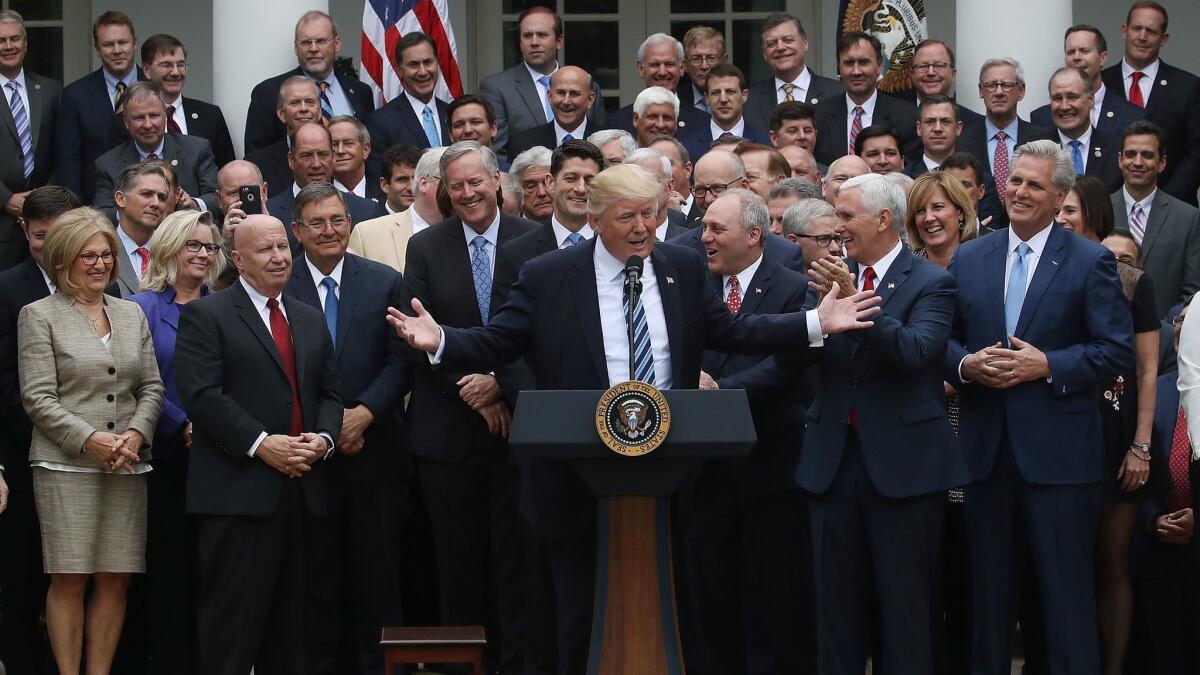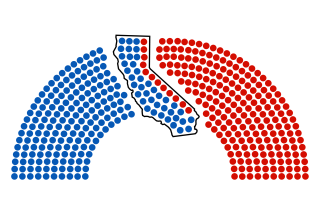As California Republicans confront a congressional wipeout, GOP leader Kevin McCarthy faces a reckoning

When the House voted to repeal the Affordable Care Act, Kevin McCarthy trooped with other Republican lawmakers to a splashy Rose Garden celebration, smiling alongside President Trump as they celebrated the moment.
As majority leader, McCarthy had helped round up the votes to narrowly pass the hard-fought legislation, convincing 13 other California Republicans to go along, even though several faced tough reelection fights.
For the record:
6:20 a.m. Nov. 29, 2018An earlier version of this article said Rep. Dana Rohrabacher was a 13-term incumbent. He is serving his 15th term.
Fewer than half will be returning in January.
With the defeat Wednesday of Rep. David Valadao, who had survived repeated challenges in his Central Valley district, Republicans will hold just seven of the state’s 53 House seats — the fewest in more than 70 years.
The Hanford Republican led on election night, but steadily lost ground as officials counted mail-in and other ballots. On Wednesday, when Fresno and Kings counties updated their tally, Democrat TJ Cox opened a 529-vote lead that effectively sealed his victory.
The GOP’s losses, highlighting a terrible midterm election for long-suffering California Republicans, have caused some to question McCarthy’s judgment.
His ability to command unwavering loyalty from his California colleagues on issues such as healthcare, gun control and an unpopular tax bill bolstered the Bakersfield Republican on Capitol Hill and raised his stock with Trump. But it may have helped decimate his home-state delegation.
In a statement, McCarthy pointed to a flood of outside spending as the source of Republican losses and also blamed how ballots are cast and counted in California, a process that allows ballots to trickle in after election day and requires painstaking review.
“There is no question there is work to be done after these election results and we intend to grow,” McCarthy said, citing an emphasis on economic issues, “strengthening our homeland” and national security.
Other factors contributed to the GOP’s California wipeout, many having nothing to do with McCarthy, who was reinstalled as leader of congressional Republicans just a few days after the midterm vote.
Costa Mesa Rep. Dana Rohrabacher lost in part because of his cozy ties to Russia. Rep. Mimi Walters of Laguna Beach antagonized voters by ducking public appearances. In the race to replace Vista’s Darrell Issa, who retires in January, Democrats acted to ensure the weakest GOP candidate emerged from the June primary, all but locking up the seat in November.
A tidal wave of cash helped Democratic challengers flood the airwaves with advertising, and an army of activists — many new to politics — blitzed competitive districts. The retirements of Issa and Fullerton’s Rep. Ed Royce left the GOP vulnerable in two districts.
But all five of the Republican incumbents who ran and lost faced headwinds of their own making, a result of unpopular votes they cast and their association with a president who is political poison in California and has no closer ally in Congress than McCarthy, or “my Kevin,” as Trump calls him.
“It’s been widely talked about how close McCarthy has grown to Trump,” said Kurt Bardella, a former aide to Issa who left the Republican Party out of frustration with its positions on climate change, race relations and other issues. “That proximity extended to the delegation and its members.”
The losses have a personal poignancy for McCarthy. A former leader of Republicans in the state Assembly, he was instrumental in shaping California’s GOP delegation. After being elected to Congress in 2006 and rising in the leadership ranks, he personally recruited Reps. Valadao, Walters and Jeff Denham to run for their seats; the latter two served with McCarthy in Sacramento and Denham was his roommate in the state capital.
Embracing Trump and appeasing the hard-line conservative wing of the GOP were shrewd steps for McCarthy, who unsuccessfully bid for House speaker in 2015 but quickly bounced back, due in part to his strong ties to the White House.
But being the president’s point person on Capitol Hill meant pushing policies that were out of step with voters back home — such as a measure to override state gun control laws — and corralling his fellow California lawmakers to help pass them.
One glaring example was the sweeping tax bill passed in December, which stands to hurt many Californians by capping deductions of state and local taxes as well as the interest on home mortgages. All but two of the state’s 14 House Republicans — Rohrabacher and Issa — voted for the GOP tax law, even though studies suggested it would have an especially negative impact on residents in pricey areas such as suburban Orange and Los Angeles counties.
The vote allowed Democrats, who are usually tagged with the tax-and-spend label, to wield the issue as a weapon and accuse Republicans of putting party loyalty ahead of their constituents’ interests.
“We need a champion for tax fairness,” said Walters’ Democratic opponent, Katie Porter, “not someone who will sell out Orange County because Donald Trump” and House leaders “asked her to do so.”
The state’s GOP delegation voted unanimously to repeal the Affordable Care Act even though that would have had a devastating impact on California, which runs the country’s largest Medicaid program, serving the poor, disabled and nursing home residents. In Valadao’s district alone, tens of thousands of residents might have lost healthcare coverage if the repeal effort had not stalled in the Senate.
For his part, Rohrabacher disputed that McCarthy, the tax bill or the attempted healthcare rollback played any role in his defeat.
“The reason I lost and we lost is because you had Bolshevik billionaires who pumped in enormous sums of money to defeat us. That was it,” the 15-term lawmaker said.
The four other ousted California members did not return phones calls and emails seeking comment.
There were reasons apart from loyalty to McCarthy to vote as they did.
For some, their votes were a matter of principle or a belief that, for instance, the tax bill would be good for the country, boosting economic growth, increasing wages and proving an overall benefit to California.
Walters had an eye on climbing the leadership ladder. Denham, who lost his Central Valley seat, was a possible candidate for chairman of the Transportation and Infrastructure Committee if Republicans held onto the House in November. Going along to get along is one way to advance in Congress.
Many also had little reason to believe the political cost would be as steep as it proved to be.
Denham and Valadao both prided themselves on being home-grown candidates who were targeted over and over by Democrats but still managed to win reelection, even in tough years for Republicans.
“Everybody knew it would be competitive,” Bardella said of the climate for California’s GOP lawmakers, “but I don’t think anybody anticipated they’d be wiped out.”
Personal regard and a debt of gratitude may have also played a role in the decision to stick by McCarthy, a gregarious personality who is popular with his California peers.
Not only did McCarthy recruit several of his California colleagues, he helped advance their careers. Valadao, who was first elected in 2012, was given a leadership role on legislation involving water, the foremost issue in the Central Valley. Walters was given a lower-rung leadership post after she won in 2014.
McCarthy raised nearly $5 million to help Republican House members targeted in California and supported an effort to put a gas-tax repeal measure on the November ballot to help boost GOP turnout.
None of it worked. The irony is that in securing his position as the top House Republican, McCarthy may have helped ensure there will be fewer from California to serve alongside him.
Barabak reported from San Francisco and Wire from Washington.
Twitter: @sarahdwire
UPDATES:
7:30 p.m.: This article was updated with a comment from McCarthy.
This article was originally published at 5:20 p.m.
More to Read
Get the L.A. Times Politics newsletter
Deeply reported insights into legislation, politics and policy from Sacramento, Washington and beyond. In your inbox three times per week.
You may occasionally receive promotional content from the Los Angeles Times.







